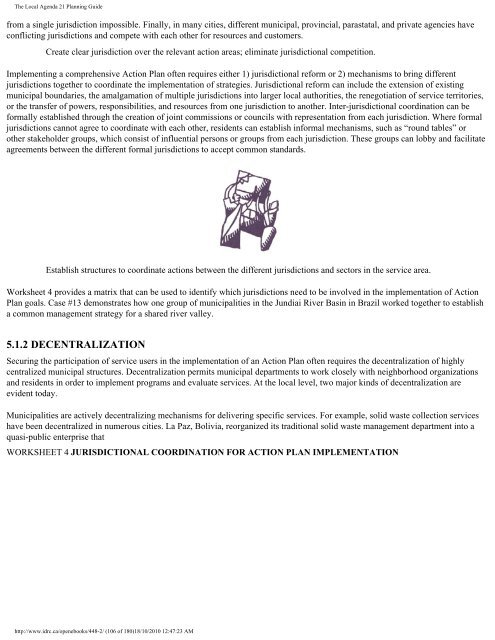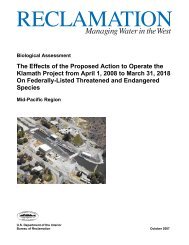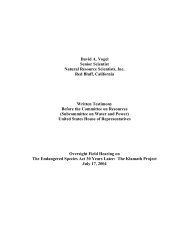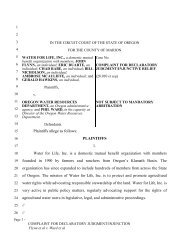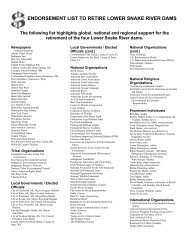The Local Agenda 21 Planning Guide - Democrats Against UN ...
The Local Agenda 21 Planning Guide - Democrats Against UN ...
The Local Agenda 21 Planning Guide - Democrats Against UN ...
You also want an ePaper? Increase the reach of your titles
YUMPU automatically turns print PDFs into web optimized ePapers that Google loves.
<strong>The</strong> <strong>Local</strong> <strong>Agenda</strong> <strong>21</strong> <strong>Planning</strong> <strong>Guide</strong><br />
from a single jurisdiction impossible. Finally, in many cities, different municipal, provincial, parastatal, and private agencies have<br />
conflicting jurisdictions and compete with each other for resources and customers.<br />
Create clear jurisdiction over the relevant action areas; eliminate jurisdictional competition.<br />
Implementing a comprehensive Action Plan often requires either 1) jurisdictional reform or 2) mechanisms to bring different<br />
jurisdictions together to coordinate the implementation of strategies. Jurisdictional reform can include the extension of existing<br />
municipal boundaries, the amalgamation of multiple jurisdictions into larger local authorities, the renegotiation of service territories,<br />
or the transfer of powers, responsibilities, and resources from one jurisdiction to another. Inter-jurisdictional coordination can be<br />
formally established through the creation of joint commissions or councils with representation from each jurisdiction. Where formal<br />
jurisdictions cannot agree to coordinate with each other, residents can establish informal mechanisms, such as “round tables” or<br />
other stakeholder groups, which consist of influential persons or groups from each jurisdiction. <strong>The</strong>se groups can lobby and facilitate<br />
agreements between the different formal jurisdictions to accept common standards.<br />
Establish structures to coordinate actions between the different jurisdictions and sectors in the service area.<br />
Worksheet 4 provides a matrix that can be used to identify which jurisdictions need to be involved in the implementation of Action<br />
Plan goals. Case #13 demonstrates how one group of municipalities in the Jundiai River Basin in Brazil worked together to establish<br />
a common management strategy for a shared river valley.<br />
5.1.2 DECENTRALIZATION<br />
Securing the participation of service users in the implementation of an Action Plan often requires the decentralization of highly<br />
centralized municipal structures. Decentralization permits municipal departments to work closely with neighborhood organizations<br />
and residents in order to implement programs and evaluate services. At the local level, two major kinds of decentralization are<br />
evident today.<br />
Municipalities are actively decentralizing mechanisms for delivering specific services. For example, solid waste collection services<br />
have been decentralized in numerous cities. La Paz, Bolivia, reorganized its traditional solid waste management department into a<br />
quasi-public enterprise that<br />
WORKSHEET 4 JURISDICTIONAL COORDINATION FOR ACTION PLAN IMPLEMENTATION<br />
http://www.idrc.ca/openebooks/448-2/ (106 of 180)18/10/2010 12:47:23 AM


